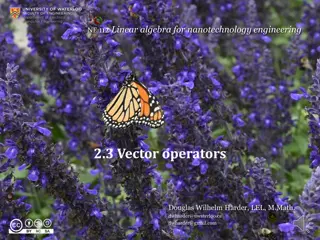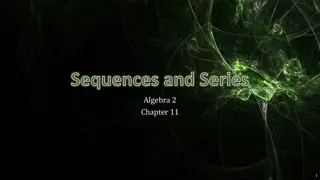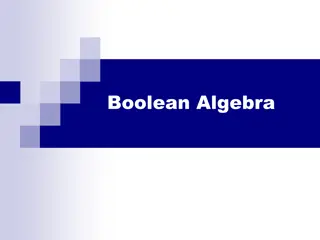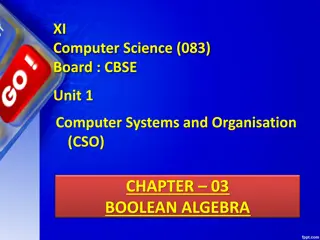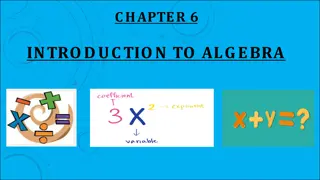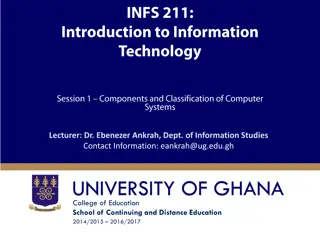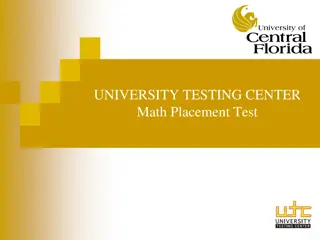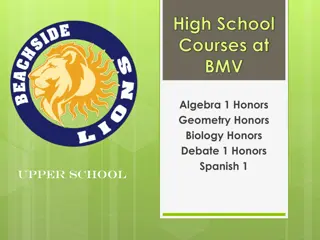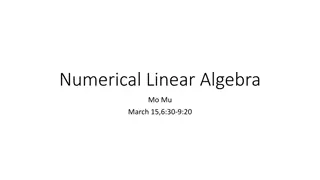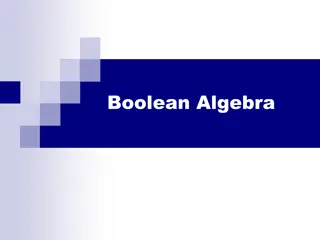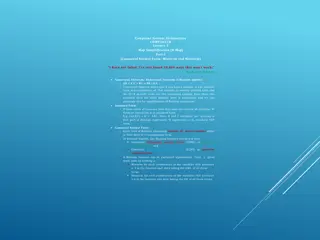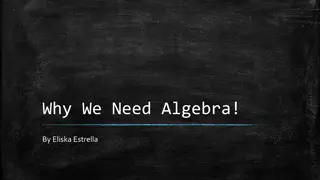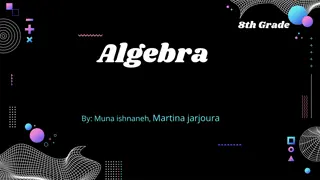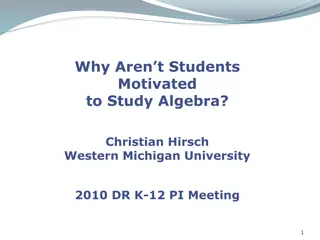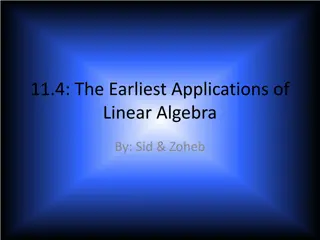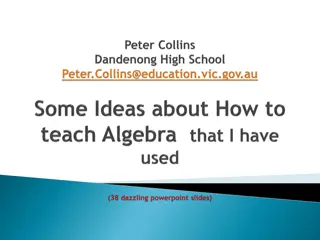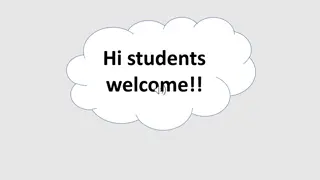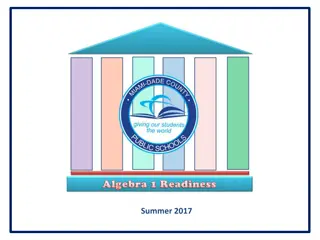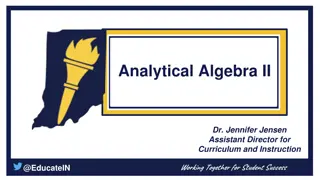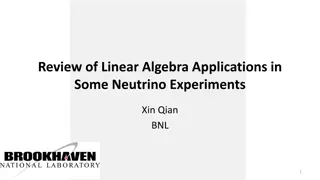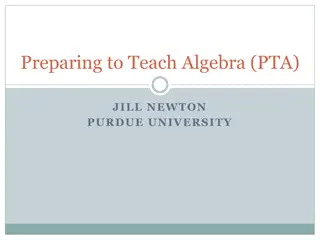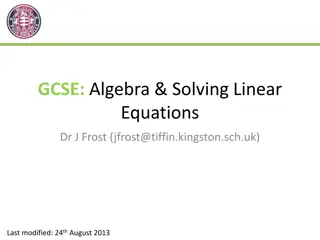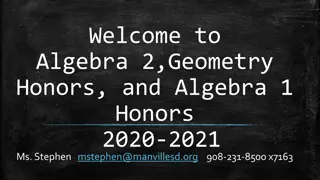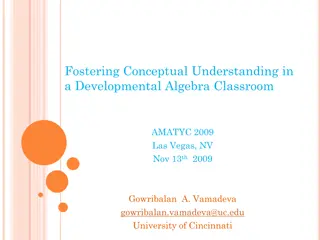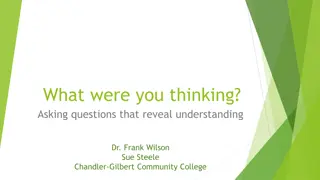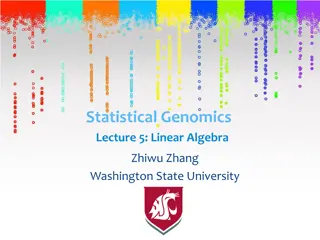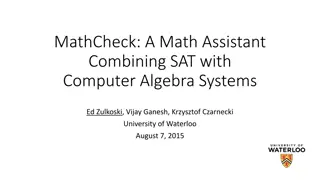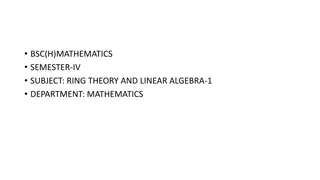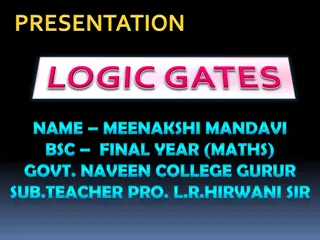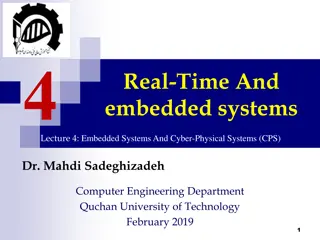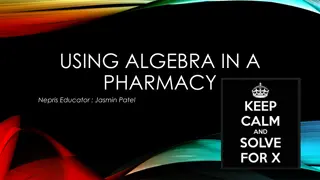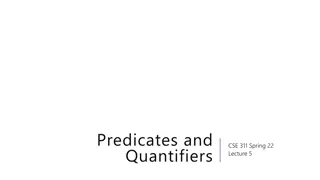Computer Organization and Architecture
A computer system is a programmable digital electronics device that processes data as per program instructions to provide meaningful output. It comprises hardware and software components, with hardware being the physical parts and software essential for driving the hardware. Computer organization fo
15 views • 71 slides
Vector Operations in Linear Algebra
Explore the world of vector operations in linear algebra through this detailed presentation. Learn about vector addition, scalar multiplication, field operations, and more. Gain insights into the notation of Fn and the significance of scalar multiplication and vector addition in linear algebra. Whet
8 views • 9 slides
Sequences and Series in Algebra 2
Dive into the concept of sequences and series in Algebra 2 with examples and diagrams from the Big Ideas Algebra 2 textbook by Larson, R., and Boswell (2022). Explore the progression of values and patterns in sequences, and learn about the sum of series to enhance your understanding of this fundamen
2 views • 58 slides
Eigen: High-Level C++ Library for Linear Algebra
Eigen is a high-level C++ library offering a range of functionalities for linear algebra, matrix and vector operations, geometrical transformations, numerical solvers, and related algorithms. It provides efficient multidimensional array storage, fast math operations, and linear algebra capabilities.
0 views • 12 slides
Boolean Algebra and Logical Statements
Introduction to Boolean algebra, logical statements, and compound statements. Explore the concepts of Boolean variables, logical operators, writing conventions, equivalence in Boolean algebra, and truth tables. Learn how to analyze and evaluate logical expressions using truth tables.
1 views • 25 slides
Computer Architecture and Organization
Computer architecture and organization are fundamental aspects of computing systems. Computer architecture focuses on the functional design and implementation of various computer parts, while computer organization deals with how operational attributes come together to realize the architectural speci
3 views • 40 slides
Boolean Algebra in Computer Science
Boolean algebra, developed by mathematician George Boole, is essential in computer systems for performing logical operations with True and False values represented as 1 and 0. It involves operators like AND, OR, and NOT, enabling digital computers to process information effectively. Truth tables aid
0 views • 52 slides
Introduction to Algebra: Understanding the Basics and History
Algebra, a fundamental branch of mathematics, uses letters and symbols to represent numbers and quantities in equations. This chapter covers the history of algebra, from its origins in ancient Egypt to its development by mathematicians like Al-Khwarizmi and Viète. Students will learn to work with a
5 views • 45 slides
Introduction to Computer Systems: Components, Types, and Functions
This session conducted by Dr. Ebenezer Ankrah covers the essential aspects of computer systems, including hardware components, types of computer systems, and information systems. Students will gain an understanding of the fundamental principles and characteristics of computer systems, enabling them
0 views • 41 slides
University Math Placement Test Overview
The University Math Placement Test is a tool to help place students accurately into math courses, ensuring their success. It consists of three practice tests - Algebra, Trigonometry, and Precalculus. Students start with the Practice Algebra Test and have the opportunity to advance based on their sco
2 views • 13 slides
Diverse High School Courses at BMV: Algebra, Geometry, Biology, Debate, Spanish
Explore a variety of high school courses at BMV including Algebra 1 Honors, Geometry Honors, Biology Honors, Debate, and Spanish 1. These courses offer a comprehensive range of subjects from math to language arts, preparing students for advanced studies and fulfilling graduation requirements. Studen
0 views • 19 slides
Comprehensive Overview of Numerical Linear Algebra Methods for Solving Linear Systems
Explore numerical linear algebra techniques for solving linear systems of equations, including direct and iterative methods. Delve into topics like Gaussian elimination, LU factorization, band solvers, sparse solvers, iterative techniques, and more. Gain insights into basic iterative methods, error
6 views • 12 slides
Evolution of Algorithms and Computer Science Through History
The history of algorithms and algorithmic thinking dates back to ancient times, with the development of general-purpose computational machines by Charles Babbage in the 19th century marking a significant advancement. The term "computer science" emerged in 1959, encompassing theoretical computer scie
1 views • 39 slides
Boolean Algebra and Logical Statements
Boolean Algebra allows for formalizing logical reasoning using variables that can be either true or false. It involves logical statements, compound expressions, logical operators like AND, OR, NOT, writing conventions, equivalence, and truth tables to determine the truth values of statements. By und
0 views • 25 slides
Boolean Algebra: Canonical Normal Form, Minterms, and Maxterms Explained
Boolean algebra concepts including Canonical Normal Form, Minterms, and Maxterms are discussed in detail, along with examples and truth table representations. The Consensus Theorem and Redundant Theorem of Boolean Algebra are also explained, highlighting simplification techniques for Boolean express
0 views • 5 slides
The Importance of Algebra in Everyday Life
Algebra plays a crucial role in various professions and daily activities such as shopping, budgeting, and problem-solving. It is essential for jobs in fields like farming, construction, animation, computer science, and more. Utilizing algebraic formulas can help in practical scenarios, like determin
1 views • 17 slides
Algebra
Dive into the world of 8th-grade algebra with Muna Ishnaneh and Martina Jarjoura. Learn about variables, mathematical expressions, and operations like addition and subtraction through examples and exercises. Explore resources to enhance your algebra skills and conquer math challenges!
0 views • 8 slides
Challenges in Motivating Students to Study Algebra: Insights from Surveys and Recommendations
Teachers face challenges in motivating students to study Algebra, as highlighted by survey findings. The most significant issues include working with unmotivated students, making mathematics accessible, and poor background preparation in certain topics. Recommendations focus on key topics of school
0 views • 13 slides
The Oldest Applications of Linear Algebra in Ancient Civilizations
Linear algebra has roots in ancient civilizations like Egypt, where mathematical problems related to land measurement, resource distribution, and taxation were solved using techniques like Gaussian elimination and Cramer's Rule. The Rhind Papyrus from 1650 B.C. contains examples of linear systems an
0 views • 30 slides
Enhancing Algebra Teaching Strategies for Educators
Dive into a comprehensive resource on effective algebra teaching methods, including tips on simplification, substitution, linear equation solving, and more. Discover the importance of proper algebra techniques and how to make the learning process more engaging for students. Explore the evolution of
0 views • 38 slides
The World of Algebra: Introduction, Uses, and Importance
Algebra is a fundamental branch of mathematics that involves solving equations with unknown variables. This post covers the definition of algebra, its significance in real life, the Father of Algebra – al-Khwarizmi, reasons for studying algebra, and practical applications like time management and
0 views • 8 slides
Algebra 1 Honors Readiness and Accelerated Student Path Overview
Understand the importance of Algebra 1 Honors preparation, required concepts, and graduation criteria. Dive into the accelerated student path standards post 6th grade. Topics include fractions, equations, proportions, statistics, and probability. Ensure readiness for a successful Algebra 1 journey.
1 views • 19 slides
Enhancing Algebra II Education for Student Success
Analytical Algebra II focuses on project-based learning with technology integration, aligning with postsecondary preparation standards. Parameters of HEA 1426 ensure course difficulty meets requirements. Considerations emphasize the importance of algebra in college readiness and achieving academic s
0 views • 5 slides
Linear Algebra Applications in Neutrino Experiments
Linear Algebra plays a crucial role in various neutrino experiments, enabling solutions in weighted least squares, energy estimation in EXO-200, and signal processing in LArTPC detectors. From Cartesian coordinates to minimizing uncertainties, linear algebra techniques contribute significantly to da
0 views • 38 slides
Mr. Buchanan's Algebra 1 Class Information
Explore detailed information about Mr. Buchanan's Algebra 1 class for the academic year 2017-2018, including expectations, homework guidelines, calculator policy, class routines, and more. Get ready for an engaging learning experience in Algebra 1 with Mr. Buchanan!
0 views • 9 slides
Reimagining Algebra Education for Non-STEM Majors: Insights from AMATYC Conference 2016
Explore the need for an algebra course tailored to non-STEM majors based on discussions at the AMATYC Conference 2016. Discover insights on revising algebra sequences, eliminating topics, and enhancing focus areas. Uncover enrollment statistics, departmental offerings, and alternative programs resha
0 views • 16 slides
Algebraic Reasoning in Education Research
Delve into the journey of Preparing to Teach Algebra (PTA) with insights on research projects, challenges faced, and the development of frameworks and protocols. Discover the algebraic focus with justification and argumentation in educational settings. Learn about important concepts, implementation
0 views • 28 slides
GCSE Algebra Revision Materials and Equations Practice
Explore a collection of GCSE algebra revision materials, including solving linear equations and common mishaps in algebraic simplification. Practice setting up equations and solving linear equations with provided examples and questions. Enhance your algebra skills through comprehensive content desig
0 views • 15 slides
Ms. Stephen's Algebra and Geometry Course Information
Ms. Stephen's 2020-2021 Algebra 2, Geometry Honors, and Algebra 1 Honors course details. Grading policy, resources on Canvas, Deltamath, Edulastic, and Edpuzzle. Built-in TI-84 calculator on Chromebook. Office hours for extra help and communication methods provided. Zoom or in-person meetings availa
0 views • 7 slides
Developmental Algebra Classroom: Fostering Conceptual Understanding
Explore the journey through developmental algebra classes focusing on fostering conceptual understanding. Delve into topics spanning Elementary Algebra I, II, III, graphing equations, traditional definitions, and more. Discover key concepts like fractions, functions, factorization, and the importanc
1 views • 14 slides
Computer Crimes and Prevention Strategies
Computer crimes involve illegal acts utilizing computer systems, leading to various consequences. This lecture covers the types of computer system attacks, motives behind computer crimes, costs, prevention strategies, and reflection on the discussed topics. It emphasizes the increasing scope of comp
1 views • 20 slides
Enhancing Student Understanding in College Algebra Assessments
Dr. Frank Wilson and Sue Steele from Chandler-Gilbert Community College discuss the issue of students memorizing procedures instead of actually understanding concepts in college algebra. They present a case study highlighting the importance of assessing conceptual mastery over procedural knowledge.
0 views • 31 slides
Statistical Genomics Lecture 5: Linear Algebra Homework Questions
Explore the concepts of random variables, covariance matrix, special matrices, and self-defined functions in statistical genomics through a series of homework questions. Gain insights into linear algebra and statistical genomics while working on Homework 1, analyzing the expectation and variance of
0 views • 22 slides
MathCheck: A Math Assistant Combining SAT with Computer Algebra Systems
MathCheck is a project focused on incorporating algorithms from Computer Algebra Systems (CAS) with SAT solvers to enhance problem-solving capabilities in math, such as counterexample construction and bug finding. The goal is to design an easily extensible system with a current focus on graph theory
0 views • 15 slides
Ring Theory and Linear Algebra in BSc (H) Mathematics
Explore the concepts of ring theory and linear algebra through examples and proofs in the context of BSc (H) Mathematics, Semester-IV. Discover the foundational principles behind abstract algebra and how they apply to mathematical structures.
0 views • 26 slides
Introduction to Logic Gates: Understanding Boolean Algebra and Applications
Meenakshi Mandavi, a final year BSc Mathematics student, discusses Logic Gates, Boolean Algebra, discovery of Boolean Algebra by George Boole, types of Logic Gates such as OR, AND, NOT, NAND, NOR, their universal properties, and uses in calculators and computers.
0 views • 8 slides
Embedded Systems and Cyber-Physical Systems
Embedded systems are specialized computer systems embedded within larger systems, such as control systems and car controllers. This lecture covers real-time aspects, applications of Cyber-Physical Systems (CPS), and examples like the Boeing 777/Airbus A380 cockpit. It discusses the design process of
1 views • 22 slides
Algebra Application in Pharmacy: Solving Two-Step Equations
Pharmacists indeed use algebra in their profession, involving basic algebra, fractions, percentages, and ratios to ensure accurate dosage calculations for medications. Solving for unknown variables in two-step equations is beneficial for pharmacists, as demonstrated in real-life scenarios like deter
0 views • 39 slides
Boolean Algebra: Predicates and Quantifiers in CSE 311 Spring '22 Lecture 5
Dive into the world of Boolean Algebra with this comprehensive guide that explores the fundamentals of predicates, quantifiers, and their applications in computer science and circuit design. Discover the concepts behind Boolean variables, logical operations, and equivalence in Propositional Logic. E
0 views • 52 slides
Pre-Algebra Problem Solving and Expressions Review
Dive into solving pre-algebra problems involving PEMDAS, distributive property, and expressions related to babysitting wages, bead designs, shopping expenses, and phone usage minutes. Learn step-by-step methods, examples, and counterexamples to strengthen your pre-algebra skills.
0 views • 28 slides

